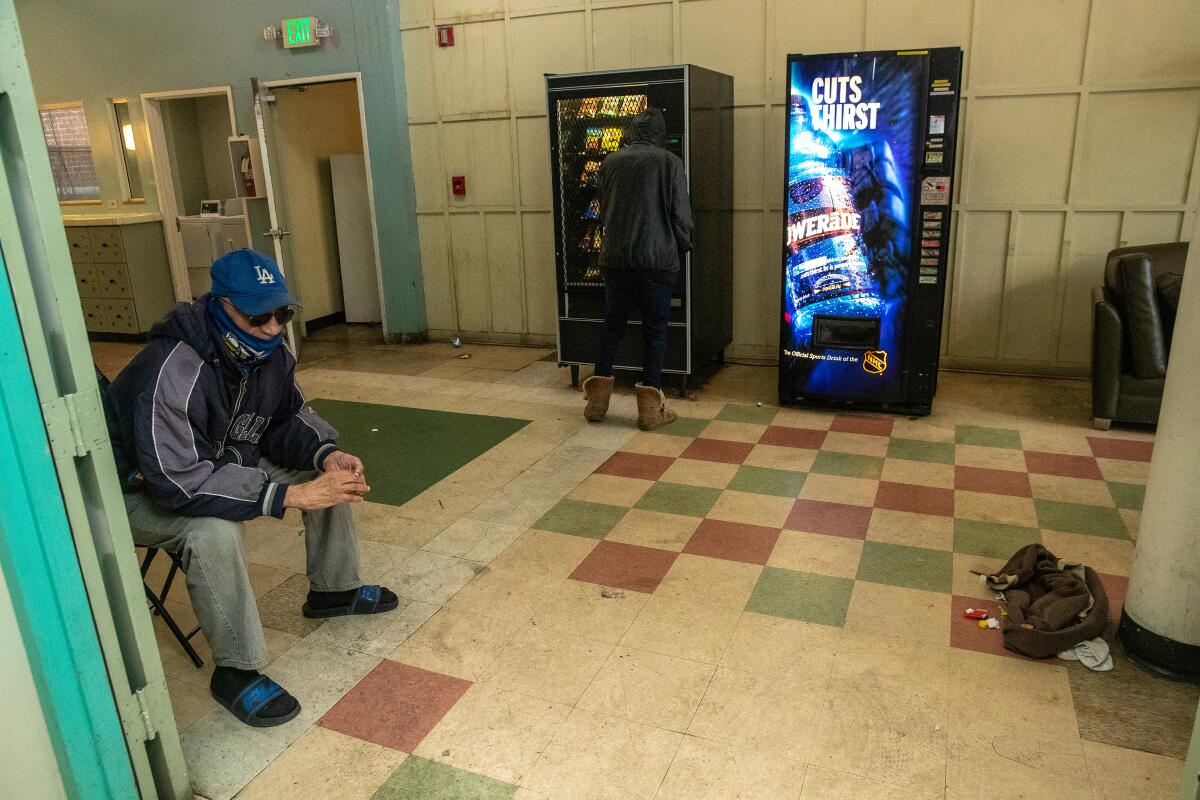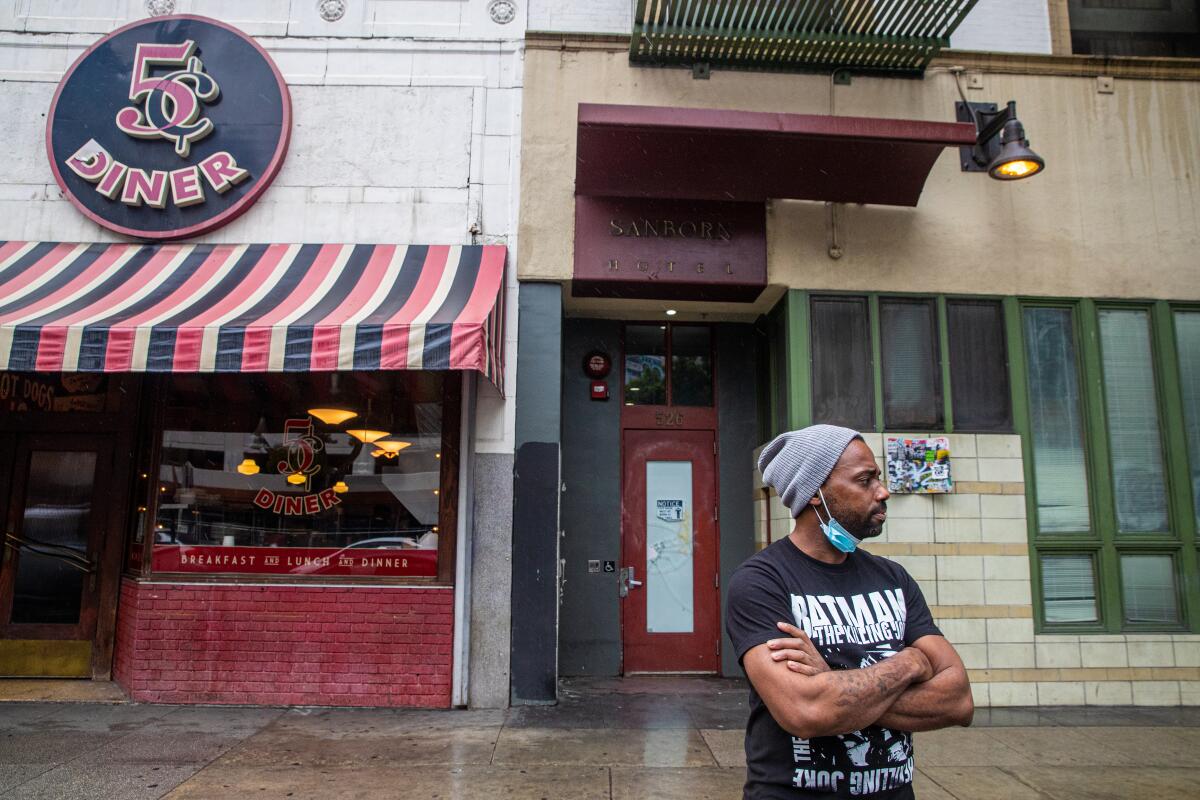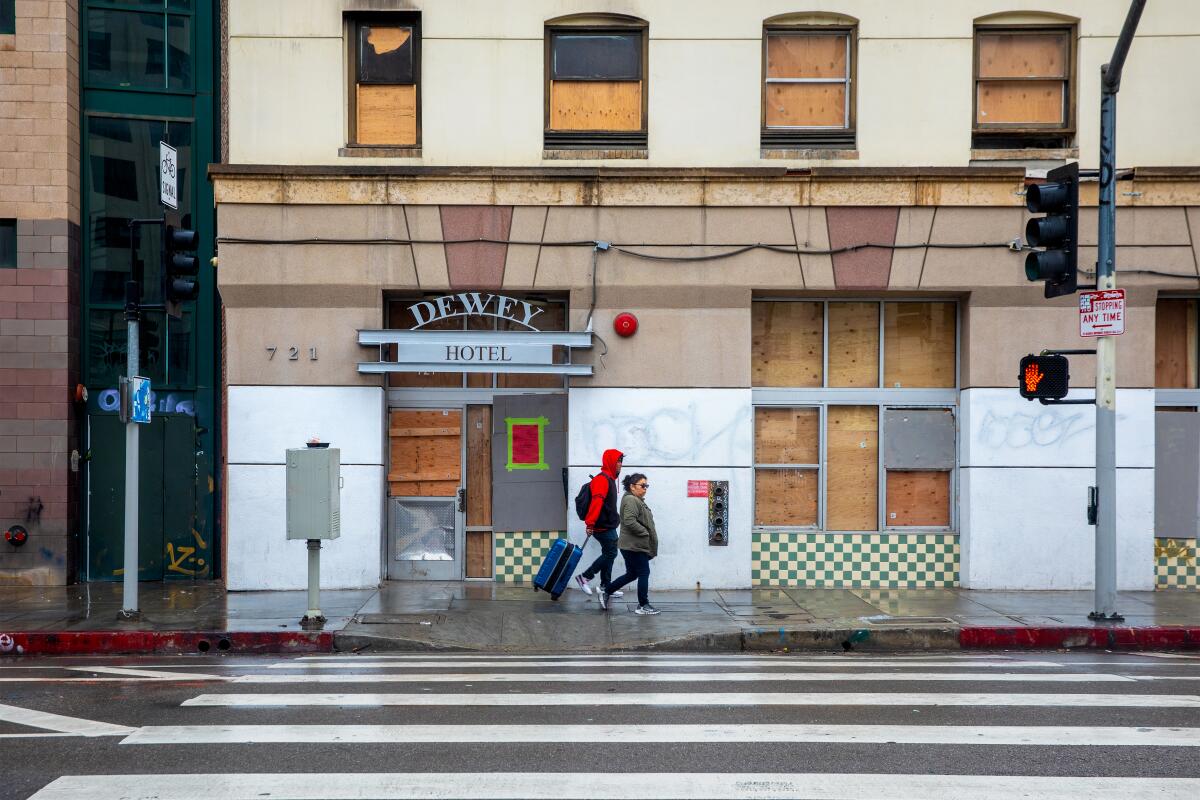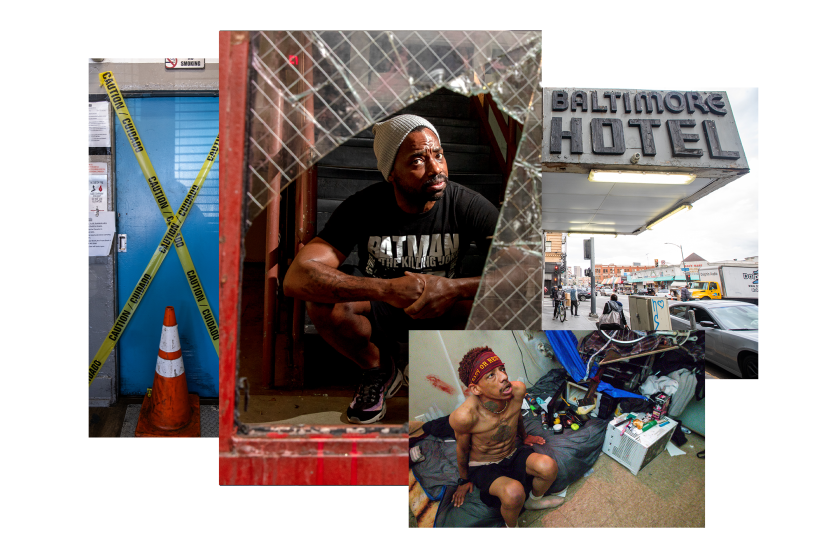Taxpayer rescue of Skid Row’s largest landlord nears $40 million

- Share via
Los Angeles city taxpayer costs to rescue the failed nonprofit Skid Row Housing Trust are now expected to approach $40 million, with officials warning more dollars will be needed in mid-2024.
The price tag stems from the trust’s financial collapse earlier this year, which led to the city petitioning a court for a receivership to oversee the charity’s 29 buildings and more than 1,000 formerly homeless tenants.
The city assumed the trust’s operating and repair costs with the hope of stabilizing the properties and turning them over to other nonprofit housing providers. The alternative of abandoning Skid Row’s largest landlord, city officials say, would destroy affordable housing, blight the community and force scores of people onto the streets.
“We are trying to prevent a humanitarian catastrophe,” City Councilmember Bob Blumenfield said in an interview.
Last Wednesday, the city’s housing and homelessness committee approved $15 million in spending, primarily to cover expenses through June. The amount, which needs sign off from the full council, is on top of $22.7 million allocated earlier this year to handle the trust’s demise.

Other landlords already have taken over seven trust properties, with another 10 expected to transfer out of the receivership in the coming months. That will leave a dozen of the trust’s oldest and most troubled buildings, which will then be targeted for redevelopment, mostly as studio apartment complexes for the same cohort of tenants. The city’s spending does not include expenses for the 12 properties past June, nor the city’s contribution to rebuilding them. Initial estimates of city redevelopment costs have been $70 million while taking years to complete.
A Times investigation has found that many of the AIDS Healthcare Foundation’s more than 1,300 residents live in squalid conditions, with dozens under the threat of eviction.
So far, the city’s rescue efforts have been beset by mistakes, blown budgets and a reliance on the same deficient financial structure that had contributed to the trust’s problems.
Some council members have been frustrated, with Blumenfield referring to the situation in an earlier committee meeting as a “black hole money pit.”
“We’re pot committed,” said Councilmember Monica Rodriguez at last week’s hearing. “At this stage, I don’t know how to bail ourselves out.”
The trust was once seen as a model for operating permanent housing with supportive services, but in February its leaders announced the nonprofit’s impending failure following years of unstable leadership and mismanagement. Adding to the trust’s issues was that public assistance programs weren’t keeping pace with the cost to manage its properties, mostly single room occupancy hotels made up of small units with shared bathrooms.
The result was dangerous and dilapidated conditions. In the final months before a judge appointed the receiver in April, one building was declared uninhabitable due to an arson and in another three residents died from drug overdoses on the same day. The council approved $700,000 in March to pay for security at the properties.
While public dollars always were anticipated to help stabilize the portfolio, City Atty. Hydee Feldstein Soto pushed for a receivership in part as a way to insulate taxpayers. The receiver, who would report to an L.A. Superior Court judge not the city, would finance operations, repairs and his own fees by borrowing money on the private market and get repaid once assets were turned over to new owners.
Recently, The Times has been investigating Skid Row’s troubled housing providers, digging into the failures of nonprofits such as AIDS Healthcare Foundation.
But the receiver Feldstein Soto chose, Mark Adams, struggled to raise money and manage the properties and, in June, resigned under pressure. Adams is one of the state’s most experienced receivers, but Feldstein Soto, Mayor Karen Bass and other city officials did not fully vet him beforehand and were unaware of his checkered history in prior assignments involving low-income tenants. Adams had been a major donor to Feldstein Soto’s campaign.
After Adams’ resignation, the city began financing the receivership, approving $10 million that was supposed to last at least four months. Instead, the money ran out in three, with a new receiver, Kevin Singer, exceeding his budget through higher than expected security and janitorial costs. The council signed off on another $12 million this fall to cover the rest of the year.

The city anticipates a portion of its $37.7 million will be repaid as properties exit the receivership and their new owners shoulder some expenses.
The receivership has been starved for funds in part because the buildings get little rental income. Ann Sewill, general manager of the Los Angeles Housing Department, estimated in Wednesday’s hearing that the properties cost about $1,000 per unit to run every month while monthly rent revenues, largely from federal subsidies, average $700 per unit.
About 30% of the 1,500 units in the 22 buildings still under receivership are vacant, according to the housing department. Four properties are less than half full with another, the 43-unit Dewey Hotel, shut down indefinitely due to February’s arson.
The financial problems have hurt rehabilitation efforts. Singer largely halted repairs during October, resuming after the city’s recent cash infusion. Singer has resolved a quarter of the more than 900 city code violations that existed when he took over, according to the housing department.
Besides covering operations through the first half of next year, the $15 million approved at Wednesday’s hearing includes $4.2 million for unpaid costs from Adams’ tenure.
Mark Adams is overseeing the welfare of 1,500 tenants in Skid Row. In prior cases involving Adams, tenants faced the risk of eviction and property owners lost their houses.
The city has been negotiating with the former receiver over money allocated to vendors and his firm’s fees, which totaled more than $800,000.
Feldstein Soto’s office hired a forensic accountant to review Adams’ billings and, in court filings, has objected to some of them, including his interactions with the media after his resignation. Adams’ invoices include a $93 charge for an email he wrote to Loyola Law School professor Jessica Levinson complaining about her quotations in a July Times story and another $93 for an email regarding a full-page ad he placed in the Los Angeles Daily News titled “An Open Letter to the People of Los Angeles” in which he defended his tenure.
The city also asked the court to disallow some of Adams’ listed expenditures on security, listening sessions with tenants, financing and other areas totaling $95,000.
The city did not, however, object to other billing, including $1,800 for an interview in May with Times reporters about his background and $1,300 that appears to be Adams’ interactions in the spring with a lobbyist he hired to advocate on his behalf to City Council members.
Karen Richardson, a spokesperson for Feldstein Soto, declined to answer a list of questions from The Times about Adams’ expenditures or provide the name and cost of the forensic accountant hired to review his bills. The city attorney’s office refused to release the accountant’s contract pursuant to a public records request, citing the active receivership court case.
Adams said in a statement to The Times that it would be inappropriate to comment on his billings because the judge had yet not determined what he should be paid.
Attorneys for the city and Adams said at a court hearing last week that they hope to resolve their disputes by mid-December.
Months before City Atty. Hydee Feldstein Soto recommended Mark Adams for the equivalent of an open-ended, no-bid contract to oversee 1,500 Skid Row tenants, Adams hosted a fundraiser for her campaign.
Citing costs, the city wants to end the receivership in the spring. The housing committee last Wednesday signed off on the housing department’s proposal to try to take over the remaining dozen properties at that time.
Should the city succeed, officials would then begin a complicated process to contract with the city’s housing authority to manage the buildings, petition the federal government to increase tenants’ monthly rental subsidies and solicit proposals from homeless housing developers to buy and redevelop the portfolio.
Plans are likely to include rehabilitating or tearing down most of the single room occupancy hotels and replacing them with new developments largely made up of studio apartments, Sewill said in a memo to the council. The projects would receive funding from the city — estimated at $70 million — and need additional support from the federal and state government like other affordable housing complexes.
Sewill projected it could take until 2031 to complete the efforts.
More to Read
Sign up for Essential California
The most important California stories and recommendations in your inbox every morning.
You may occasionally receive promotional content from the Los Angeles Times.











